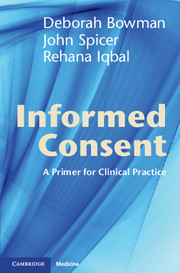Chapter 4 - Voluntariness
the freedom to choose
Published online by Cambridge University Press: 05 January 2012
Summary
Introduction
For the seeking of consent to be a meaningful process, there must be a meaningful choice. In other words, consent must be voluntary. At first sight, this is a statement unlikely to surprise, and readers might be wondering why it warrants a chapter dedicated to voluntariness. However, agreeing to the importance of voluntariness in theory and ensuring its enactment in clinical practice are two distinct processes. It is also noticeable that in most of the literature relating to consent, attention to the subject of voluntariness is rare and, where it happens, discussions are usually focused on consent to participate in research. The vast majority of those reading this book will have little difficulty in nodding sagely in agreement with the statement that consent must be voluntary. Yet this chapter will argue that, in the daily practice of medicine, voluntariness can quickly be overlooked or compromised.
On the nature of coercion
Overt coercion in healthcare is rare. Most clinicians will not need persuading that coercion has no place in an effective therapeutic relationship. On closer examination, however, there are several factors that perhaps mean we should not dismiss coercion as an irrelevance without further thought.
- Type
- Chapter
- Information
- Informed ConsentA Primer for Clinical Practice, pp. 56 - 75Publisher: Cambridge University PressPrint publication year: 2011



